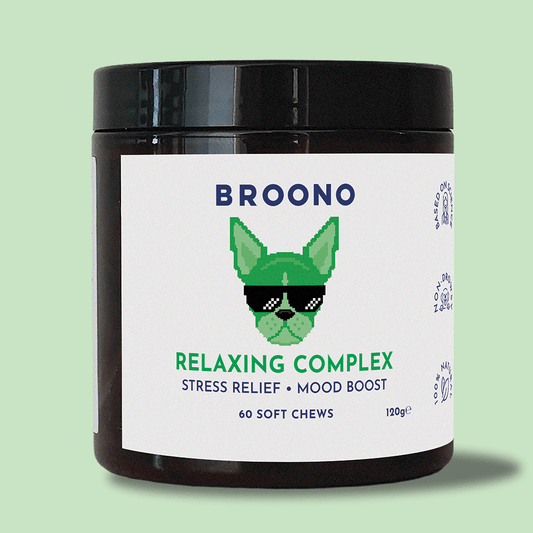Key Benefits of Magnesium for Dogs
Magnesium is an essential mineral with a broad range of roles in maintaining a dog's health. It is involved in muscle contraction, nerve transmission, energy metabolism, and mood regulation. In particular, magnesium influences the production of key neurotransmitters such as serotonin and GABA, which are central to maintaining emotional balance and promoting relaxation. By facilitating these processes, magnesium can help alleviate stress, anxiety, and hyperactivity in dogs.
Each form of magnesium varies in how effectively it’s absorbed and used by the body. Factors such as bioavailability and functionality differ depending on the compound it is bound to, making certain forms more suitable for specific purposes. For instance, some forms excel in supporting digestive health, while others are particularly effective in enhancing muscle relaxation or calming effects.
- Calming and Anxiety Relief: Magnesium helps regulate neurotransmitters that influence mood and stress. It is especially beneficial for dogs prone to separation anxiety, noise phobias, or hyperactivity.
- Supports Muscle Function: Magnesium ensures proper muscle contraction and relaxation, preventing cramps and spasms. This is particularly important for active or aging dogs.
- Energy Production: Magnesium plays a role in the production of ATP (adenosine triphosphate), which fuels energy at the cellular level.
- Bone Health: Magnesium works with calcium and phosphorus to maintain strong bones and teeth, supporting the skeletal system, especially in growing puppies and senior dogs.
Comparing Different Forms of Magnesium
When considering different forms of magnesium, it’s essential to understand how each one differs in its bioavailability, calming effects, and digestive impact. Let's compare the most typical forms of magnesium.
Magnesium bisglycinate (or glycinate) is widely regarded for its high bioavailability and its exceptional ability to promote calmness and relaxation. This form is bound to glycine, an amino acid that has calming properties of its own, making it particularly effective in managing anxiety and nervousness in dogs. Additionally, magnesium glycinate is gentle on the stomach, causing fewer gastrointestinal issues compared to other forms, which makes it ideal for long-term use.
Magnesium gluconate also offers good bioavailability and is well-tolerated. While it may not have the added calming benefit of glycine, it still effectively supports the nervous system and helps alleviate mild to moderate anxiety in dogs. This form is typically recommended for dogs that need general stress relief without risking digestive discomfort.
Magnesium citrate, on the other hand, is best known for its digestive benefits. It has moderate bioavailability and is often used to relieve constipation due to its mild laxative effect. While it does contribute to muscle relaxation, its calming effects are limited compared to glycinate or gluconate, making it more suitable for digestive regulation than anxiety relief.
Magnesium oxide is a highly concentrated form of magnesium, but it is poorly absorbed by the body. Because of its low bioavailability, magnesium oxide is not ideal for calming purposes and is more commonly used for replenishing magnesium levels over a short period. It may also cause digestive issues, including constipation, if used in excess.
Magnesium glycinate stands out as the superior choice for promoting calmness and relaxation, while magnesium gluconate offers a more moderate solution with good overall absorption. Magnesium citrate is better suited for digestive support, and magnesium oxide serves more niche purposes due to its poor absorption and potential for digestive side effects.
Why We Use Magnesium Bisglycinate
We meticulously select ingredients to ensure they deliver the highest efficacy for the intended benefit. For our calming supplements, we opt for magnesium glycinate due to its exceptional ability to support nervous system function, promote calmness, and reduce anxiety.
Magnesium bisglycinate is a combination of magnesium and glycine, an amino acid with naturally calming properties. Glycine is a neurotransmitter that directly affects the nervous system, promoting relaxation and improving mood stability. The combination of magnesium and glycine not only helps regulate anxiety-related neurotransmitters like serotonin but also assists in muscle relaxation, making it particularly effective for dogs who experience both physical and emotional stress.
How to Incorporate Magnesium into Your Dog’s Diet
To effectively incorporate magnesium into your dog’s diet, it’s important to choose the right form and dosage based on their specific needs. Magnesium glycinate is ideal for dogs that experience chronic anxiety, as it provides calming effects without causing digestive upset. You can find magnesium supplements in various forms, including powders, chews, and tablets, that can be easily added to your dog’s daily routine.
Additionally, combining magnesium with other calming ingredients like L-Theanine (contained in green tea), L-Tryptophan, Passionflower, and Vitamin B6 can enhance its calming effects. These ingredients work together to regulate mood, reduce stress, and promote relaxation in a natural way.
Frequent Questions
1. Can I give magnesium to my dog for anxiety?
Yes, magnesium, especially in the form of magnesium bisglycinate, is effective in reducing anxiety and promoting calmness in dogs. It helps regulate neurotransmitters that are responsible for mood and stress management.
2. How do I know if my dog needs magnesium supplementation?
If your dog displays signs of anxiety, muscle tremors, or restlessness, they may benefit from magnesium supplementation. Always consult your vet before adding any supplements to your dog’s diet.
3. Can magnesium cause side effects in dogs?
Magnesium bisglycinate is generally safe and well-tolerated. Whereas other forms of magnesium, such as magnesium citrate or oxide, can cause digestive upset.
4. How long does it take for magnesium to start working for anxiety in dogs?
Magnesium supplements, especially in bioavailable forms like magnesium glycinate, may take a few days to a couple of weeks to show noticeable effects. The calming effects on anxiety can gradually improve as magnesium levels in the body balance out. Consistency is key, so it’s important to follow the recommended dosage and allow time for the supplement to work.
5. What other ingredients work well with magnesium for calming effects?
Magnesium works synergistically with other calming ingredients like L-Theanine, Passionflower, and L-tryptophan. These ingredients enhance magnesium’s ability to relax the nervous system, promote mood stability, and improve sleep quality in dogs. Combining magnesium with these ingredients provides a more comprehensive solution for managing stress and anxiety.
6. Can I give magnesium to my dog every day?
Yes, magnesium bisglycinate is safe for long-term use, and it can be given daily to manage chronic anxiety, stress, or muscle tension in dogs. It’s important to follow the recommended dosage based on your dog’s weight.





